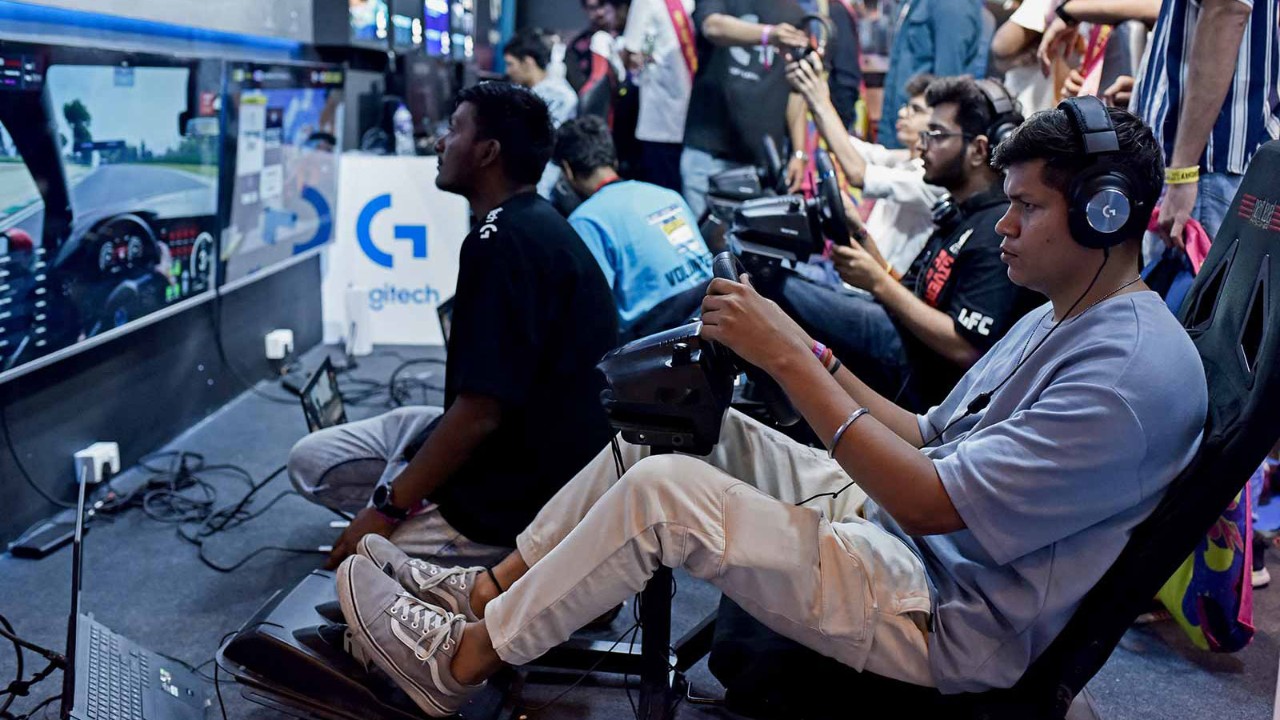
India’s gaming industry is in the midst of a major evolution, driven by a surge in smartphone usage during the pandemic that has made the country the world’s biggest consumer of mobile games. Though facing hurdles such as heavy taxation and ethical issues tied to real money gaming (RMG), the sector is still on a strong growth trajectory, powered by technological innovation and a young, digitally connected population.
The Indian gaming market is projected to expand to US$9.2bn by 2029 – a compound annual growth rate of 20%. With the country’s 591 million active gamers in 2024 each spending an average of 13 hours a week playing games, the industry is poised for sustained explosive growth, according to venture capital fund Lumikai.
India’s GST Council imposed a 28% tax on the gaming sector
The current boom can be traced back to the Covid-19 pandemic. ‘The sale of cellphones and laptops boomed in the two years of Covid, and that has aided the gaming industry to go where it is today,’ explains Sidhartha Gautam, partner in risk advisory at KPMG. ‘India has one of the largest smartphone populations across the globe, and internet usage is also the cheapest compared with other countries.’
Monetisation is on the rise. Some 148 million gamers make average in-game payments of US$22 annually, with in-app purchases growing by 41% year on year. RMG – online games where players deposit funds with the expectation of winning real money based on skill or luck – constitutes a significant portion of the industry. Nearly half of the country’s gaming revenue of INR330bn (US$3.87bn) comes from RMG, according to PwC estimates.
Heavy taxes
The rapid growth of the RMG segment comes with significant taxation and ethical challenges. ‘If I were to give you the top five risks the gaming industry in India is facing, the topmost is regulatory and compliance risk,’ says Gautam.
In 2023, India’s GST Council imposed a 28% tax on the gaming sector, coupled with a flat 30% income tax on online gaming winnings for individuals (taxed at source). Amid rising global public health concerns over gambling, the tax hikes have forced RMG businesses to rethink their offers and structures.
‘The government wants to curb the gaming companies to a very large extent,’ Gautam says. ‘The gaming companies have not responded very positively to this heavy taxation. It squeezes their profits massively and the margins are very thin.’
State governments have taken a hard stance against RMG businesses. For instance, Tamil Nadu has proposed banning RMG gameplay between midnight and 5am, capping daily playtime at four hours and limiting monthly wagers. States like Odisha, Andhra Pradesh and Telangana have gone further, banning RMG platforms outright.
Rulings
Games often have contentious legal definitions in India. While the Supreme Court has classified games like rummy and fantasy cricket as skill-based and legal, state courts have issued conflicting rulings on games such as poker. ‘Skill-based online games and chance-based online games are taxed differently,’ says Arjun Ananth, manager for emerging technologies at PwC. ‘Companies should be careful in classifying what their offerings are.
‘Managing cross-border transactions means that companies have to understand and comply with different regulatory requirements, anti-money laundering rules and foreign exchange controls. It can complicate the reconciliation and reporting of revenues earned in multiple currencies and jurisdictions.’
‘Because of regulatory uncertainty, private equity investors have stepped back’
Risk and uncertainty
It has all added pressure on gaming businesses. ‘The issue is the financial risk – the dependency on users who are coming on the platform and spending, especially on the in-app purchase that one has to do that makes revenue very unpredictable,’ Gautam explains.
Investors are increasingly cautious. ‘Because of this entire regulatory uncertainty, a lot of private equity investors have stepped back,’ Gautam says. ‘The gaming companies that have recently started or are mid-size are facing a massive funding crunch. It’s not a very easy path for the gaming industry to grow financially.’
Growth vs regulation
Despite regulatory pressures tempering expectations for RMG businesses, the sector is forecast to maintain a 10% CAGR to 2028, according to a PwC report, and to generate 200,000 to 300,000 more jobs through direct and indirect opportunities, spanning roles in development, IT support and customer care.
‘The future of the gaming industry depends on how games are being developed and played,’ says Rajesh Dhuddu, partner for emerging technologies at PwC India, in the report. ‘From a business and user standpoint, it’s imperative to look at how games are monetised and distributed.’
Gaming businesses need to take proactive measures to ensure sustainable growth, starting with ‘early tracking of in-game purchases and revenue streams’, advises Gautam. Ananth points to the need for ‘scalable financial reporting systems’ that can not only handle growing transaction volumes but also provide real-time insights for tax compliance and business decisions.
Scenario planning and forecasting have become more important than ever
With a dual GST system, where both central and state governments collect a share of tax on goods and services through multiple tax slabs ranging from 0% to 28%, scenario planning and forecasting have become more important than ever. Ananth says: ‘This is helping gaming companies simulate and plan to understand the impact of GST rates on their pricing strategies, margins and overall profitability.
‘The compliance regulations surrounding gaming are evolving rapidly and companies need to be agile and to adapt their compliance frameworks and financial reporting practices to meet new requirements.’
More information
Read our careers articles for advice on working in the gaming industry, through social networks for gamers and content streaming.

